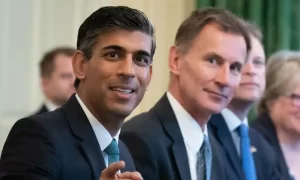
The UK government spent less than it reaped in from taxpayers last month helping to push yearly borrowing £30bn lower than projected by forecasts, officials figures out today reveal.
The difference between what the government generated in revenue and spent hit a positive £5.4bn, meaning the UK’s public finances were in surplus last month, according to the Office for National Statistics (ONS).
Analysts had expected the government to borrow £8bn last month.
A large increase in self assessment income tax payments, typical in January due to self-employed people having to file their tax returns by the end of the month or face penalties, pumped up government revenue.
January’s surplus means the government did not borrow any money. It was also a bigger surplus that the Office for Budget Responsibility forecast in November.
So far, yearly borrowing has undershot the budget watchdog’s forecast by just over £30bn, “which could tempt the Chancellor to offer a pay increase to public sector workers as part of his budget next month, hoping to prevent another wave of strikes,” Yael Selfin, chief economist at KPMG UK, said.
Jeremy Hunt and Prime Minister Rishi Sunak have been fielding calls from Conservative backbenchers to reverse a six percentage point corporation tax increase landing in April.
Hunt is expected to shun tax cuts and spending rises in his 15 March budget to ensure the government hits their fiscal rules, namely, getting the debt burden falling and capping borrowing at three per cent in five years.
“Getting debt down will require some tough choices, but it is crucial to reduce the amount spent on debt interest so we can protect our public services,” he said today.
ONS figures showed the debt to GDP ratio was running at nearly 100 per cent, levels last seen in the 1960s.
Experts said the Chancellor is likely to stick to his word.
“Hunt has made it clear that there will be no room for significant tax reductions. We would tend to take him at his word,” Philip Shaw, economist at Investec, said.
There were signs in the ONS’s figures that the country’s public finances are still facing enormous strain from historically large spending pressures.
Interest payments in January on the near £2.5 trillion UK debt pile hit their highest level since records began in 1997 at £6.7bn.
A large chunk of the country’s debt stock is tied to an old measure of inflation, the retail price index, which has been running in the double digits for several, which has raised the cost of servicing debt.
Bank of England governor Andrew Bailey and the rest of the rate setting committee’s efforts to tame inflation with 10 straight interest rate rises has also raised the debt servicing bill.
Spending to help families with the sky high cost of living held back the size of the UK’s fiscal surplus.
“January’s high annual self-assessed tax receipts were partly offset by substantial spending on energy support schemes,” the ONS said.
Hunt has been paying the difference between how much energy companies spend on sourcing gas and electricity and charging households to keep typical annual bills no higher than than £2,500.
The cap is poised to rise to £3,000 April, although international energy prices have collapsed to pre-Russia-Ukraine war levels, raising pressure on Hunt to ditch the cap altogether.
Keeping the cap at £3,000 would likely delay the pass through from lower international energy prices until the summer.
Read more:
Jeremy Hunt faces calls for budget giveaways as UK borrows £30bn less than forecast






